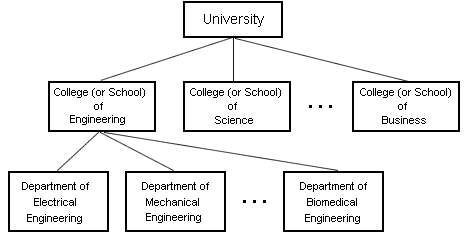 |
|
8.1 A College or University in America or Canada The word college typically, but not always, refers to an academic institution that offers post high school education but not graduate (Master's or Doctoral) education. A university typically refers to an academic institution that offers graduate (Master's or Doctoral) as well as undergraduate (Bachelor's) education. A college or university in America or Canada is a stand-alone entity, whether public or private. A public institution is subsidized by the government directly, whereas a private college is not. More details on public and private institutions are included in Chapter 5. An academic institution of higher education (college or university) may offer degrees in many programs of studies. For example, it may offer undergraduate or graduates degrees in electrical engineering, mechanical engineering, business administration, English, Mathematics, and so on. The institution may have many colleges, each focused on a particular discipline, such as a College of Engineering, College of Science, College of Business, and so on. Here is some potential confusion in terminology. Sometimes the colleges within an institution are called schools, so for example the institution may have School of Engineering, Business School, Medical School, and so on. The equivalent terminology in Canada is faculty; for example, such Canadian institutions have Faculty of Engineering, Faculty of Commerce, Faculty of Science, and so on. Each college or school (faculty in Canada) has departments to manage specializations within a discipline; for example, the College of Engineering may have Department of Electrical Engineering, Department of Mechanical Engineering, Department of Biomedical Engineering, and so on.

A university is not a bureaucratic governing body for setting syllabus, and conducting and grading exams for a collection of affiliated and competing colleges offering the same degrees. This situation is quite in contrast to the system in India. Consider the Delhi University, which has many affiliated and competing colleges, such as Miranda House, Lady Shri Ram College, St. Stephen's College, and so on. These colleges offer competing degrees in the same programs. The Delhi University sets the courses to be taken by the students as well as syllabus for each course. Students from these colleges take the common final exams, which are set, conducted, and graded by the Delhi University. Each university in America and Canada, in contrast, has only one college or school (or faculty) that offers a particular degree and your professor is responsible for all aspects of teaching and evaluating. This particular structure in America and Canada has a serious implication: You must follow carefully and rigorously what your professors say. When they say something, they mean it; it is the last word. You can not ignore their instructions and wait for some final exam to rescue you from being lazy throughout the course. You must put in consistent effort throughout the course. Your assessment on intermediate tasks - such as homework assignments, laboratory work, projects, mid-term exams - as well as on the final exam counts towards the final grade. In a way, the system is easier to score good grades, because the effort is spread out throughout the course and you have many opportunities to affect your grade; the system takes away the risk of "having a bad day" on the final exam.
|
 |
|
 |
|||||


